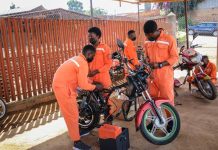Africa-Press – Rwanda. Based on recent figures from the Ministry of Finance and Economic Planning, Rwanda has started to reap from its long and strategic investment and incentives it has and still committing to the ICT sector to make it a source of economic growth.
According to the latest statistics released by the Ministry, the local economy recorded an impressive growth of 8.2 per cent, 2 per cent above the experts’ predicted one of 6.2 per cent.
However, the source of growth was not the traditional sectors but rather the ICT sector, which experienced a 35 per cent growth.
Comparing the data, this year ICT overtook Tourism and Hospitality as the leading services driver sector. Nevertheless, unlike the Tourism and Hospitality industry where the opportunities and benefits that come with the expansion and development of the sector are somewhat extent evenly distributed, the ICT sector is quite different.
The scattered location nature of National Parks has been the magnet behind the proliferation of private investments in districts that host these nature landmarks which in return has ensured even distribution of opportunities and sharing of benefits of the booming sector across the country.
In contrast, for the ICT sector due to the high concentration of industry key players big and small in the urban areas specifically the city of Kigali, the benefits from this burgeoning services sector are yet to be equally distributed.
Today, almost all sector entrepreneurship support organizations are found in Kigali despite it having the lowest population size compared to other provinces of the country.
According to the Rwanda Population and Housing Census, the City of Kigali has a population of slightly above 1.7 million residents compared to 3.5 million in the Eastern Province, slightly above 3 million people in the Southern Province, and almost 3 million people in the Western Province.
City of Kigali has the highest number of people owning smartphones and using the internet but the high presence of entrepreneurship support organizations continues to undermine inclusive growth.
This imbalance if it goes unchecked, risks the birth and exacerbation of unequal distribution of opportunities created by the increasing digitization of some of the economic activities which could worsen the digital divide gap between urban and rural people with the potential to drive up the rural-urban migration.
The statistics show that in the last five years, 354,970 people migrated to the capital making the City of Kigali rank first followed by the Eastern Province.
A situation that the Hanga Hubs project desires to prevent by ensuring that young people in the countryside gain access to training, and get equipped with skills that would enable them to significantly improve their innovation, creativity, and entrepreneurial skills to start and sustain successful businesses.
Anchored on Empowering Innovation for Smart Cities, the 16 project intends to establish well-functioning and equipped innovation hubs with the capacity to identify, nurture, and support local talents and entrepreneurs in four districts; Rusizi, Muhanga, Nyagatare, and Rubavu to build scalable businesses in their hometowns.
The major objective of the project is to provide tailored support to empower individuals with innovative ideas and catalyze the creation of startups to unlock economic opportunities in high-potential sectors with a keen focus on digital-driven growth to make sure that opportunities are evenly distributed.
Beneficiaries
Funded by the European Union and implemented by the Government of Rwanda, specifically Rwanda Information and Society Authority in partnership with the ICT Chamber, the project targets to give training and mentorship to 1000 people aged between 18 to 35 years, build and support 192 startups and create 768 direct jobs.
To ensure inclusivity, 30 per cent of trainees will be women while 3 percent of the total beneficiaries are people with disabilities.
The project is hailed as one of the groundbreaking interventions toward ensuring that all young Rwandans regardless of their residence get access to and benefit from seemingly exogenous economic growth sources.
For More News And Analysis About Rwanda Follow Africa-Press






